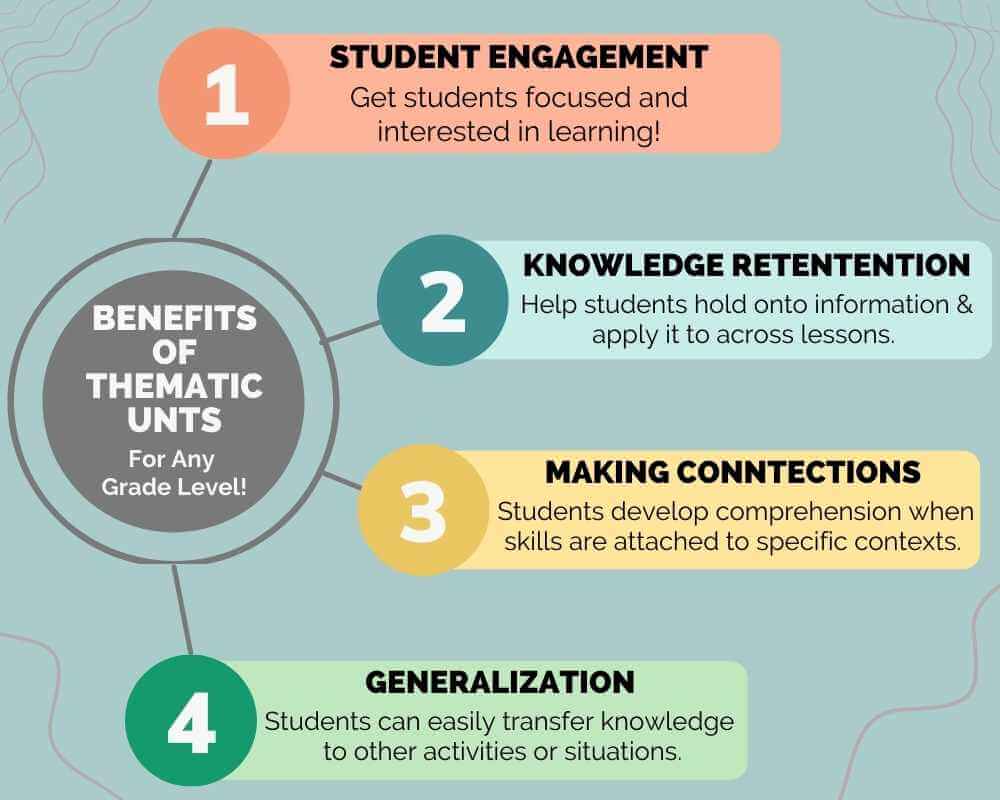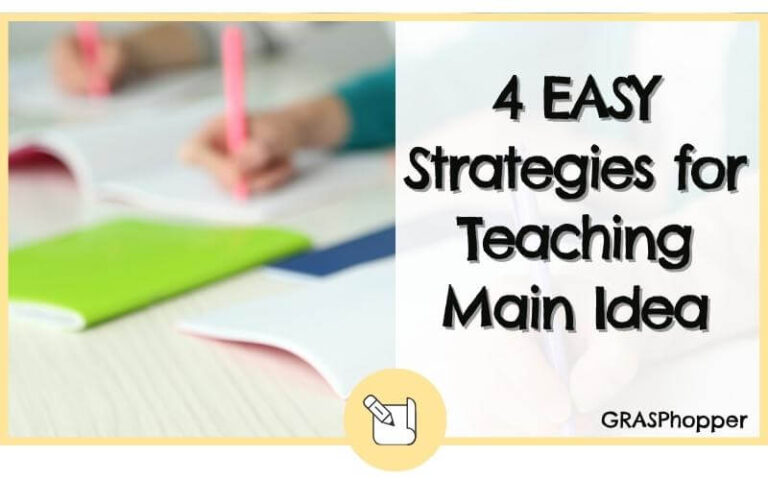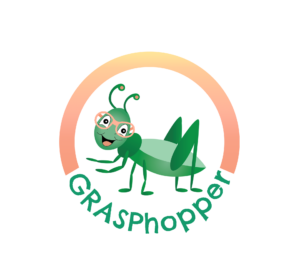Thematic units have been a complete game changer for us. Wanna know why?

First, it reduced our lesson planning in half (an educator’s dream). The other reason is that we’ve seen higher student engagement, which makes the lessons more enjoyable for everyone. Not only can thematic learning help you as an educator, but there are lots of positive outcomes for your students, as well.
What are thematic units?
Chances are you have seen (or even been using!) thematic units in your classroom and didn’t know it. Most new-ish English textbooks these days organize concepts into thematic units.
Thematic units or learning is when you use curriculum and resources that are connected to a topic. These topics are what we call themes. The themes can be very specific or more general. Themes can include holidays, seasons, or one specific topic. For instance, in kindergarten, a teacher can teach about community jobs for a month. While in third grade, a teacher can teach about geography for 3 weeks. A speech language pathologist can use a fall theme to target a variety of student goals for the season. The amount of time spent on one theme can vary. Themes can be taught over a week, month, or even an entire semester.
The idea, however, is that you bring in several skills, concepts, and activities together within the unit. For example, when teaching about fall, you can read poetry, write about fall, read informational texts, describe artwork, and more.

4 Benefits of Thematic Units
We see lots of trends in education, but there is a reason that thematic units have made a comeback – and stuck. How educators use thematic units in their classroom is going to vary, but the benefits still stand.
Thematic learning has been proven to help students of all ages and backgrounds. Many educators have found that the traditional approaches to learning lack student engagement, connections across a variety of environments, and generalization of skills – they just aren’t cutting it. But thematic units offer a new tool – and a pretty simple one – to overcome those barriers.
#1 STUDENT ENGAGEMENT
WHAT IS STUDENT ENGAGEMENT?
Student engagement is when students are focused and motivated during the learning process. When your students are engaged, you see them participate and interact with the concepts and ideas being taught. This is probably the most talked about element in education!
HOW DOES THEMATIC LEARNING IMPROVE STUDENT ENGAGEMENT?
There are many thematic unit ideas that you can use. Remember when Amung Us was all your students could talk about? When Amung Us was really huge, educators everywhere were creating resources – and they were blowing up. Even GimKit created an Amung Us-style game for reviewing. Our students were always hooked.
When educators began to create lessons and units around Amung Us, they were engaging in thematic unit ideas! And what did they often report? Seeing a huge spike in classroom engagement and discussion. Subjects that students may have typically dreaded, now become exciting places of learning.
Thematic learning allows you to draw attention to certain content and skill, and motivate students more effectively. According to a study by Robin Penna Baskinger, “As students were becoming more engaged in the lesson, they were also able to utilize their other content area skills, and participants saw a notable connection between the level of engagement and prior knowledge skills.” Like we said, the research backs it up.
Essentially, thematic learning shows us that learning can be fun! We have seen it. Students are more likely to get excited about a theme (like Amung Us) as opposed to a lesson on capitalization. Theme based learning helps to build intrinsic motivation to engage your students. They will want to engage in your curriculum or activities because they are enjoying learning, not because they have to learn.
That’s why many of GRASPhopper’s resources have been created using themes! We know engagement comes from beyond the topic of the lesson, and we want to help get your students excited to learn. Our Fall Themed Bundle, for instance, takes topics students normally don’t love and turns up the engagement. This bundle focuses on writing, retelling, and comprehension. Can you imagine teaching a lesson on these important foundational skills, and truly having students engaged? These thematic unit ideas will get you there!

# 2 KNOWLEDGE RETENTION
WHAT IS KNOWLEDGE RETENTION?
Knowledge retention is the ability to hold onto the information learned and remember it for future lessons and beyond.
HOW CAN THEMATIC UNITS IMPROVE KNOWLEDGE RETENTION?
Do you ever teach your students something one day and then ask them the next day about the concepts they just learned and they DON’T remember? One reason for this is that they don’t have a context to organize the information in. Much of memory is connected to our emotions and the connections we make. If students are bored and disconnected…how are they going to retain information? By using a theme your students will be able to attach the information that they learned in a context. This helps them to hold onto the information and apply it later with different lessons and activities.
We know many of our schools are culprits to the traditional learning methods. Students have to memorize information in order to perform on a test or task. This type of learning doesn’t foster retention in your students. In fact, your students lose most of what they learned through traditional learning methods. Meanwhile, when learning by themes, students are involved in hands-on learning and projects that relate to the topic. It gives them a context to apply the information they are learning to. Themes will help your students improve their memory retention of the concepts you are teaching.
Think about it like this… How many classes do you remember from college? It’s likely, a lot of the information you retained and learned didn’t really stick unitl into you got in the classroom. Once you’re immersed in your job, that is when you actually learn and retain all that information that they tried to teach you in college.
Our traditional textbook approach to college courses gave us the illusion we were learning, but it wasn’t until we were immersed in the career that we understood and remembered the skills needed to thrive. The same thing applies with our students. When immersed in a theme it helps to retain the information since we are using it in context.
#3 MAKING CONNECTIONS
WHAT DOES IT MEAN TO MAKE CONNECTIONS?
Making connections is the ability of a student to make meaning from what they are learning by applying it to their lives or other ideas or concepts that they are learning.
HOW CAN THEMATIC UNITS IMPROVE CONNECTION MAKING?
When teaching your students, you not only want them to learn but to truly understand the information. By making connections or attaching ideas and skills to specific contexts, it is proven that your students will build a better understanding of the information that you are teaching.
Thematic units help students develop a deeper level of understanding by making connections to a topic. Essentially, they develop their critical thinking skills. Instead of teaching a skill in isolation, thematic units intertwine and weave together multiple skills, texts, genres, and so on (such as reading and writing). Therefore, students are making connections across texts and skills – building deeper critical thinking and synthesizing skills!
Students can also make connections to their personal lives. We know through research that the ability for students to personally connect with content is key to their retention. This helps your students to see WHY they are learning the information and how it applies to them personally. This is what makes a theme based approach effective for your students.

#4 GENERALIZATION
WHAT IS GENERALIZATION?
Generalization is the ability for your students to take the information that is taught to them and apply it in different environments (such as settings, topics, or real-life scenarios).
HOW CAN THEME BASED LEARNING IMPROVE GENERALIZATION?
We’ve probably all said it at some point. “I just taught this unit last week. Now that we are doing a new activity, they act like they’ve never done it before!” This is a classic example of students not being able to transfer knowledge. Aka, not having generalization of a skill.
Once your students understand the information, they need to apply it in different contexts as well as real life scenarios. Transferring the knowledge that they obtained in the classroom, and applying it to different contexts or real world situations becomes easier when it is attached to themes.
Themes help your students become more aware of the value of what they are learning and how it’s used and applied in different environments. Once your students make the connections across themes, they can problem solve and use that information in a variety of themes applied to their everyday lives.
When teaching, our main goal is that the information they learned is generalized, so that later on in their life, they are able to recall that information and apply it. Attaching the skill or topic to a theme gives it meaning and makes it easier to transfer and apply the knowledge that they learned in different situations. Hopefully you can tell that we are really passionate about thematic units! We truly have seen their magic in our own lessons, and these four benefits show that it’s worth giving it a try. Start small. You can plan a week’s worth of lessons and activities with a certain theme. Websites like NewELA and CommonLit also make it easy to plan ELA content thematically.
REFERENCES:










